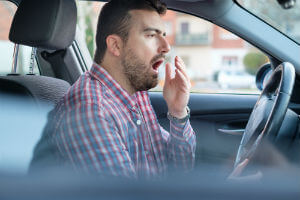
Fatigued or drowsy driving is responsible for eight times more accidents than traffic safety experts previously believed, according to a 2018 AAA Foundation for Traffic Safety.
If you were injured by a drowsy driver, contact Gordon & Partners’s West Palm Beach car accident lawyers to discuss your legal rights after an auto accident. As accomplished personal injury lawyer s, we will explain the legal options available to you to determine if you have a case against the at-fault party that entitles you to compensation.
The Dangers of Drowsy Driving
The AAA Foundation for Traffic Safety’s 2018 study is one of the most in-depth analyses of how drowsy driving affects motorists’ ability to safely operate a motor vehicle.
In the study, researchers reviewed drivers’ faces in the three minutes leading up to a crash in dash cam footage from more than 700 auto accidents.
The results indicate that 9.5 percent of all crashes and 10.8 percent of crashes resulting in significant property damage involved drowsiness. In contrast, federal data estimates that fatigue is a factor in just one to two percent of crashes.
Additionally, the study found that drowsiness was present three times more during nighttime crashes than during daylight hours.
The study’s researchers believe many fatigue-related auto accidents go unreported for because it can be difficult to detect drowsiness after a crash.
Drowsy driving can negatively affect a person’s ability to safely drive by:
- Delaying reaction time
- Impairing vision
- Impairing judgment
- Impairing short-term memory
- Reducing awareness
- Nodding off
The study’s researchers determined these factors affect a motorist’s ability to process information and increase the likelihood of being involved in an auto accident . For this reason, the dangers of drowsy driving are significant and should be avoided.
How to Prevent Drowsy Driving
To avoid the symptoms caused by drowsy driving, you should not operate a vehicle if you have not slept for at least eight hours within a 24 hours period.
In addition to getting the recommended amount of sleep each night, other ways to prevent drowsy driving include:
- Do not drive when you are tired – Only drive during times when you are accustomed to being awake and active. If you normally sleep at night, do not drive during this time because your body associates the time with sleeping.
- Avoid driving while on medication – If you are prescribed medication that affects your physical state, carefully review its label for any warnings that pertain to driving. You should also follow your doctor’s recommendations for which activities to avoid while on the medication, including driving.
- Take breaks – If you are traveling a long distance, plan a break every two hours or 100 miles. If you feel tired while driving, consider taking a break to stretch, run in place, or engage in another activity that increases your awareness and alertness.
- Take a nap during long-distance trips — If you are traveling alone on a long-distance trip, consider pulling off to the road to take a 20-minute nap in a safe place like a parking lot of a rest area.
- Travel with a passenger – If possible, travel with a passenger who you can take turns with driving the vehicle or take control of the wheel during an emergency.
Contact a Compassionate Lawyer
Drowsy drivers put others on the road at tremendous risk. If you were injured because of a drowsy driver, contact an experienced lawyer.
Gordon & Partners’s car accident lawyers will investigate your claim and gather evidence to help prove that your auto accident was the result of the at-fault party’s negligence. We will represent you during each stage of the claims process to help you recover the maximum compensation you deserve.
Do not hesitate to contact us for a free, no obligation consultation to learn more about your legal options. We only work on a contingency fee basis, which means you do not have to pay us unless we recover compensation for your claim.
Call 1 (855) 722-2552 to get started today.

 1-855-722-2552
1-855-722-2552